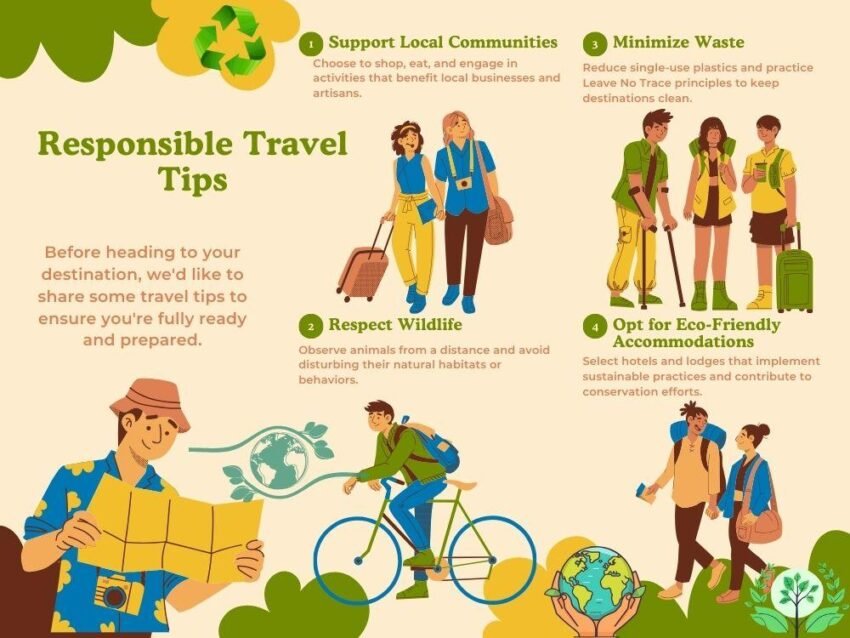Importance of Sustainable Travel
Traveling sustainably is more than a trend; it’s a necessity in today’s world. Tourism accounts for a significant portion of global carbon emissions and environmental degradation, making it essential for travelers to adopt eco-friendly practices. By embracing sustainable travel, you can reduce your impact on the environment, preserve cultural heritage, and contribute positively to local communities. Sustainable travel ensures that future generations can enjoy the beauty and diversity of our planet while helping current destinations thrive.
Choosing Eco-Friendly Accommodations
Your choice of accommodation can significantly affect your environmental footprint. Here’s how to select eco-friendly places to stay:
- Certified Properties: Look for accommodations with certifications like LEED, Green Key, or EarthCheck that meet sustainability standards.
- Local Options: Choose locally owned hotels, guesthouses, or eco-lodges to support the local economy.
- Energy Efficiency: Opt for accommodations that use renewable energy sources, energy-efficient appliances, and smart technology to minimize waste.
- Water Conservation: Stay in properties that actively reduce water consumption through measures like low-flow fixtures and rainwater harvesting.
- Sustainable Practices: Check if the hotel has recycling programs, avoids single-use plastics, and sources food locally.
Reducing Your Carbon Footprint
Minimizing your carbon emissions is a critical aspect of sustainable travel. Consider these strategies:
- Offset Emissions: Invest in carbon offset programs to balance the emissions generated by your trip.
- Travel Light: Packing lighter reduces fuel consumption in airplanes and other modes of transportation.
- Stay Longer: Opt for fewer, longer trips instead of multiple short ones to reduce overall travel emissions.
- Choose Direct Flights: Non-stop flights are more fuel-efficient than connecting flights.
Transportation Choices
How you get to and move around your destination can make a big difference:
- Public Transit: Use buses, trains, or subways instead of renting cars or taking taxis.
- Biking or Walking: Explore destinations on foot or by bike to enjoy a zero-emission experience.
- Carpooling: Share rides through carpooling apps or services to minimize vehicle use.
- Electric Vehicles: Rent electric or hybrid cars if driving is necessary.
- Train Travel: Opt for trains over flights for short-to-medium distances; they are often more sustainable.
Packing Reusable Items
Packing reusable items can help you avoid single-use plastics and reduce waste:
- Water Bottles: Bring a reusable water bottle and refill it instead of buying bottled water.
- Utensils: Carry reusable cutlery, straws, and food containers for meals on the go.
- Shopping Bags: Pack lightweight, reusable bags for groceries and souvenirs.
- Toiletries: Use refillable toiletry containers and solid products like shampoo bars to minimize plastic waste.
- Coffee Cups: Bring a travel mug for coffee or tea on the road.
Supporting Local Communities
Sustainable travel isn’t just about the environment; it’s also about people. To make a positive impact:
- Shop Locally: Buy souvenirs and products from local artisans and markets.
- Eat Local: Dine at locally owned restaurants that source ingredients from nearby farms.
- Hire Local Guides: Engage with local tour operators to learn about the destination while supporting the community.
- Respect Customs: Understand and honor local traditions, dress codes, and cultural practices.
- Give Back: Volunteer or participate in community-based projects if time allows.
Avoiding Over-Tourism
Over-tourism can strain local infrastructure and harm the environment. Help prevent it by:
- Traveling Off-Season: Visit popular destinations during their off-peak seasons to reduce crowding.
- Exploring Alternatives: Discover less-visited destinations that offer similar experiences without the crowds.
- Being Mindful: Respect local residents and avoid disrupting their daily lives.
- Spreading Out: Avoid clustering in tourist hotspots and explore lesser-known areas.
Being Mindful of Wildlife and Nature
Respecting nature and wildlife is crucial for sustainable travel. Here’s how you can help:
- No Wildlife Interactions: Avoid activities that involve touching or feeding wild animals.
- Stay on Trails: Stick to marked paths to minimize damage to ecosystems.
- Eco-Tours: Choose tours led by certified eco-guides who prioritize conservation.
- Leave No Trace: Carry out all waste, including biodegradable items, to preserve the environment.
- Avoid Souvenirs: Don’t buy products made from endangered species or other environmentally harmful materials.
Apps and Tools for Sustainable Travel
Technology can be a great ally in traveling sustainably. Some helpful apps include:
- Ecosia: A search engine that plants trees with your searches.
- PackPoint: Helps you pack efficiently to avoid overpacking.
- HappyCow: Locates vegan and vegetarian restaurants, which often have a lower environmental footprint.
- Glooby: Offers eco-friendly travel recommendations.
- iOverlander: Provides information on sustainable camping spots and eco-friendly services.
Conclusion
Sustainable travel is about making conscious decisions that benefit the environment, local communities, and future generations. From choosing eco-friendly accommodations to supporting local economies, every step you take can contribute to a more sustainable world. By embracing these practices, you’ll not only reduce your impact but also enrich your travel experiences. So, on your next adventure, travel with purpose and leave a positive footprint behind.
